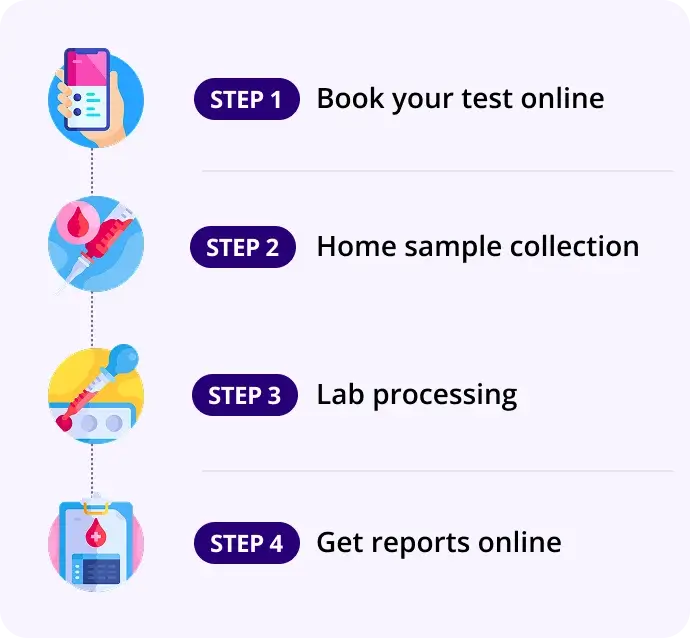Search for
24 Hrs Urinary Proteins
Kidney
Report in 4Hrs
At Home
No Fasting Required
Details
Specialized test evaluating kidney function and detecting proteinuria (protein loss in urine)
₹199₹450
56% OFF
FREE:
Ai Insights
24 Hour Urinary Proteins - Comprehensive Medical Test Guide
- Why is it done?
- Measures the total amount of protein excreted in urine over a 24-hour period to assess kidney function and detect proteinuria
- Diagnose kidney disease or monitor progression of existing renal conditions
- Evaluate diabetic patients for diabetic nephropathy
- Monitor patients with hypertension and suspected kidney involvement
- Assess protein loss in nephrotic syndrome and other glomerular diseases
- Monitor response to treatment in kidney disease patients
- Evaluate persistent proteinuria detected on routine urinalysis
- Typically performed during initial kidney disease evaluation or when abnormal protein levels are suspected
- Normal Range
- Normal/Reference Range: Less than 150 mg/24 hours (or <0.15 g/24 hours)
- Units of Measurement: Milligrams per 24 hours (mg/24h) or grams per 24 hours (g/24h)
- Negative/Normal Result: <150 mg/24h indicates healthy kidney filtration with minimal protein loss
- Abnormal/Positive Result: >150 mg/24h indicates proteinuria and potential kidney disease
- Borderline Range: 150-500 mg/24h may require further evaluation and repeat testing
- Nephrotic Range: >3500 mg/24h (>3.5 g/24h) indicates significant proteinuria consistent with nephrotic syndrome
- Interpretation
- Microalbuminuria (30-300 mg/24h): Early sign of kidney disease; commonly seen in early diabetic nephropathy and hypertension
- Mild Proteinuria (150-1000 mg/24h): Indicates mild glomerular dysfunction or early chronic kidney disease
- Moderate Proteinuria (1000-3500 mg/24h): Suggests moderate kidney disease progression; requires investigation and treatment
- Nephrotic-Range Proteinuria (>3500 mg/24h): Indicates significant glomerular disease; associated with nephrotic syndrome with low serum albumin and edema
- Factors Affecting Results: Fever, intense exercise, stress, urinary tract infections, pregnancy, menstruation, and dehydration can transiently increase protein levels
- Clinical Significance: Persistent proteinuria indicates structural or functional kidney abnormality requiring further investigation and management to prevent progression to renal failure
- Glomerular Filtration Rate (GFR) Consideration: Results should be interpreted alongside serum creatinine and calculated GFR to assess overall kidney function status
- Associated Organs
- Primary Organ System: Kidneys and urinary system - specifically the glomerular filtration barrier
- Associated Conditions - Glomerular Diseases: IgA nephropathy, membranoproliferative glomerulonephritis, focal segmental glomerulosclerosis, minimal change disease, membranous nephropathy
- Diabetic Nephropathy: Progressive kidney damage from Type 1 or Type 2 diabetes mellitus
- Hypertensive Kidney Disease: Chronic hypertension causing glomerular and tubular damage
- Systemic Autoimmune Diseases: Systemic lupus erythematosus, vasculitis, Goodpasture syndrome causing secondary glomerulonephritis
- Genetic Disorders: Alport syndrome and hereditary nephritis
- Infections: Post-infectious glomerulonephritis and endocarditis-associated glomerulonephritis
- Potential Complications of Abnormal Results: Progressive kidney disease, chronic kidney disease (CKD) stages 1-5, acute kidney injury, nephrotic syndrome with hypoalbuminemia and edema, end-stage renal disease requiring dialysis or transplantation, cardiovascular complications
- Follow-up Tests
- Serum Creatinine and Estimated GFR: Essential to assess overall kidney function and stage chronic kidney disease
- Serum Albumin and Total Protein: Evaluate for hypoalbuminemia and assess protein loss severity
- Serum Electrolytes (Sodium, Potassium, Calcium): Monitor for electrolyte imbalances associated with kidney disease
- Blood Lipid Panel: Assess lipid abnormalities common in nephrotic syndrome
- Urinalysis with Microscopy: Evaluate for hematuria, casts, and type of proteinuria
- Urine Protein Electrophoresis: Identify type of proteinuria (selective vs. non-selective) and detect monoclonal proteins
- Urine Albumin-to-Creatinine Ratio (UACR): Spot urine test that provides comparable information; useful for monitoring consistency
- Serological Tests: ANA, complement levels (C3, C4), anti-GBM, ANCA if autoimmune glomerulonephritis suspected
- Renal Ultrasound or CT Imaging: Assess kidney size, architecture, and exclude obstruction or masses
- Kidney Biopsy: May be indicated for nephrotic-range proteinuria or unclear etiology of kidney disease
- Monitoring Frequency: Repeat testing every 6-12 months for stable chronic kidney disease, more frequently for rapidly progressive disease or after treatment initiation
- Fasting Required?
- Fasting Required: No - Food and fluid intake do not affect 24-hour urine protein results
- Standard Patient Preparation: No special fasting requirements; patient may eat and drink normally
- Collection Instructions: Discard first morning void; collect all urine for exactly 24 hours starting from second morning void; maintain urine in provided sterile container; refrigerate container during collection
- Medications - No Special Restrictions: Continue all regular medications unless specifically instructed otherwise by physician; do not discontinue ACE inhibitors, ARBs, or other kidney-protective medications
- Conditions to Postpone Test: During menstruation, fever, acute illness, or within 1-2 days of intense exercise, as these conditions can cause temporary elevation in urinary protein
- Hydration: Maintain normal hydration throughout 24-hour collection period; avoid excessive fluid intake or dehydration
- Container Handling: Use designated sterile container provided by laboratory; do not use regular toilet or bedpan without collection device; keep container on ice or refrigerated at 2-8°C throughout collection
- Documentation: Record exact start and end times of 24-hour collection period; complete all required patient information on collection container and requisition form
How our test process works!

